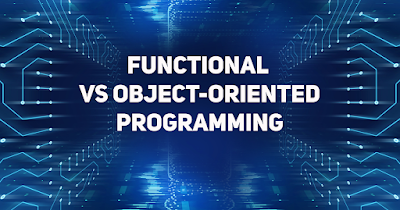Imperative vs Functional vs Object-oriented Programming
 |
| Imperative vs Functional vs Object-oriented Programming |
1. Imperative Programming:
Definition:
- Imperative programming is a paradigm where the program consists of a sequence of statements that change the program's state.
Key Characteristics:
- Uses statements that change a program's state.
- Emphasizes how to perform a task.
- Common in languages like C, Pascal, and Fortran.
Example:
# Imperative Python code
total = 0
for num in range(1, 6):
total += num
print(total)
2. Functional Programming:
Definition:
- Functional programming is a paradigm that treats computation as the evaluation of mathematical functions and avoids changing state and mutable data.
Key Characteristics:
- Avoids changing state and mutable data.
- Emphasizes expressions and declarations.
- Common in languages like Haskell, Lisp, and Scala.
Example:
# Functional Python code total = sum(range(1, 6)) print(total)
3. Object-oriented Programming (OOP):
Definition:
- Object-oriented programming is a paradigm where the program is organized around objects that represent real-world entities, and data and functions are encapsulated within these objects.
Key Characteristics:
- Organizes code into classes and objects.
- Emphasizes encapsulation, inheritance, and polymorphism.
- Common in languages like Java, Python, and C++.
Example:
# Object-oriented Python code
class Summation:
def __init__(self):
self.total = 0
def add_numbers(self, nums):
self.total = sum(nums)
# Creating an object
summation_obj = Summation()
summation_obj.add_numbers(range(1, 6))
print(summation_obj.total)
4. Comparison:
1. State Management:
- Imperative: Focuses on changing state.
- Functional: Avoids changing state, emphasizes immutability.
- Object-oriented: Organizes state within objects.
2. Paradigm Emphasis:
- Imperative: How to perform a task.
- Functional: What to perform; emphasizes expressions.
- Object-oriented: Organizes code around objects and their interactions.
3. Code Structure:
- Imperative: Uses statements and procedures.
- Functional: Uses functions and expressions.
- Object-oriented: Uses classes and objects.
4. Common Languages:
- Imperative: C, Fortran, Pascal.
- Functional: Haskell, Lisp, Scala.
- Object-oriented: Java, Python, C++.
5. Pros and Cons:
- Imperative: Explicit, but can lead to complex code.
- Functional: Promotes clear and concise code but has a learning curve.
- Object-oriented: Encourages modularity and reuse but can be more verbose.
Choosing a programming paradigm often depends on the problem domain, team expertise, and specific project requirements. Many modern languages support multiple paradigms, allowing developers to choose the most suitable approach for a given task.

